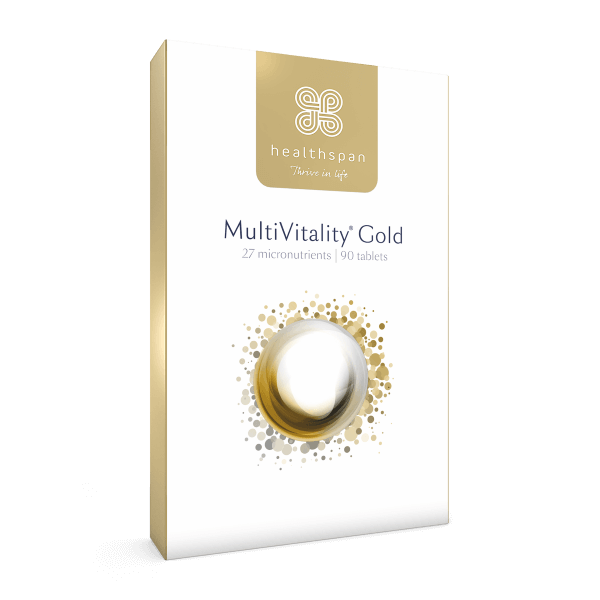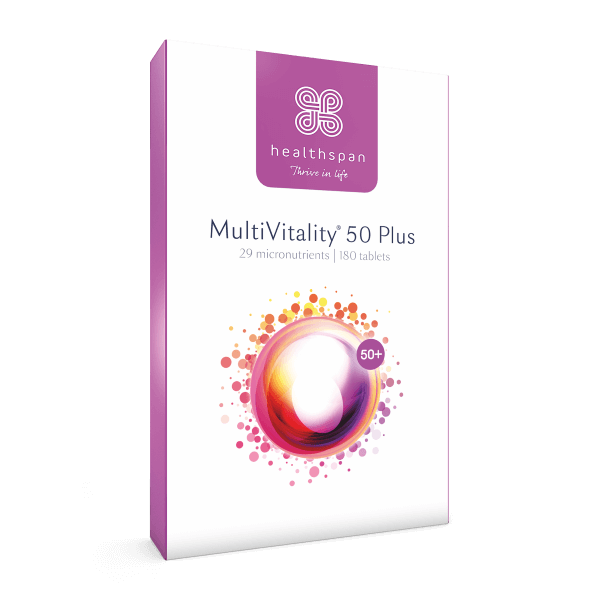Whether due to dietary preferences, medication, age or other factors, we can't always get the nutrients we need from our diet. Could a multivitamin help? Patsy Westcott investigates.
🕒 11 min read
The World Health Organization describes vitamins, minerals and other micronutrients (nutrients needed in tiny amounts) as 'magic wands' for growth and development. There is a growing mountain of evidence that certain nutrients, food groups, and patterns of eating can help us stay healthy throughout life, as well as helping to bolster us against disease as we get older.
It's always important to eat a diet rich in plant-based foods – think fresh veg, fruit, wholegrains, peas, beans and pulses and nuts and seeds – and lower in animal-based food, especially fatty and processed meats. Your diet should include five fruit and veg a day, together with two portions of fish a week, one of which should be oily.
But although a varied, nutritious diet is a key cornerstone of health, it's not always possible to get everything we need from food alone. If this is the case it could be time to consider a micronutrient supplement.
Are you deficient in micronutrients?
The National Diet and Nutrition Survey (NDNS) is a rolling study of the eating habits of people living in the UK. The latest findings from the survey, which began in 2008, show that significant numbers of adults of all ages are not getting the micronutrients they need from food.
In fact, according to the survey, a significant section of the population has an intake below the Lower Recommended Nutrient Intake (LRNI) for several nutrients including iron, zinc, magnesium, potassium, selenium and iodine. The LRNI is the level of nutrients needed for the relatively small number of people with low nutrient needs (about 2.5% of the population). A nutrient intake lower than this will likely lead to deficiency symptoms.
The study also highlights a decline in blood levels of folate, the natural form of folic acid found in green leafy veg, beans, peanuts, whole grains and liver. Folate is essential for healthy growth and development.
It also revealed that one in six people is deficient in vitamin D – the sunshine vitamin created by the action of sunlight on skin in the summer months and also found in foods such as ox liver, egg yolks, cheese and some mushrooms. The UK government recommends taking a 10 microgram vitamin D supplement daily between October and April and all year round in some population groups.
Even without outright deficiency, however, a suboptimal intake of nutrients can affect health and vitality, especially as we age.

DRV, RDA, NRV or RNI? Nutritionist Sarah Dumont-Gale explains the confusing terminology surrounding dietary recommendations and nutrient intakes.
You could be short of micronutrients if you:
- Are not eating enough (e.g. you're cutting calories to lose weight).
- Avoid whole food groups or certain nutrients because you are vegetarian, vegan or following a diet such as paleo, low-carb or keto (e.g. vegetarians and vegans are especially prone to deficiency of vitamin B12, as found in meat, fish, milk, eggs and other animal-derived foods).
- Often skip meals – either accidentally because of a busy lifestyle or deliberately due to intermittent fasting or time-restricted eating.
- Have food intolerances or sensitivities, or a medical condition that means you need to avoid certain food components, such as gluten.
- Have problems absorbing nutrients due to a medical condition such as coeliac disease or inflammatory bowel disease (IBD) or ageing (see below).
- Avoid certain foods for religious reasons.
- Have a poor diet with too many sweet and/or fatty foods and not enough vegetables, fruit and fibre.
- Are older (see below).
Around 2 billion people across the world lack micronutrients in their diets. Even in developed countries growing numbers of people have 'hidden hunger' as a result of nutrient-poor diets.
The vitamin and mineral needs of older people
Our nutrient needs and the way our bodies handle nutrients change as we go through life. However, in the UK at least, there has been no official age-specific advice for those aged 65 and over since 1992, when an influential government report called for more research into this important question.
This is especially worrying in the light of a large systematic review and meta-analysis – a study of studies – that concluded 'micronutrient deficiencies pose a considerable threat to independence and longevity.' The review included more than 28,000 people aged 65 or more. It analysed the intake of some 20 nutrients, highlighting six of special concern: vitamin D, vitamin B1 (thiamin), vitamin B2 (riboflavin), calcium, magnesium and selenium.
Why you may be short of micronutrients as you age
Factors that increase the risk of a shortage of micronutrients in later life include:
- Smaller appetite due to changes to the nervous system and the hormones that control appetite.
- Loss of taste and smell, making food less appealing.
- Changes to body composition such as more fat and less muscle, together with lower activity levels leading to fewer calories being consumed.
- Changes to the digestive system such as delays in stomach emptying (gastroparesis).
- Decline in the absorption of important micronutrients, such as calcium, vitamin D and vitamin B12.
- The effects of certain medications, such as for heart disease, nervous system diseases, gastric conditions and diabetes. These can dent absorption of nutrients, especially of vitamin B12, sodium and magnesium.
- Poor dental health leading to avoidance of hard-to-chew foods such as certain fruits, nuts and veg, chewy meat and some breads.
- Loss of interest in cooking and enjoyment of food and eating.
- Inflammageing (age-linked increase in inflammation). According to a 2021 study inflammation changes the profile of trace elements as we age (e.g. increases copper and decreases selenium and zinc).
Potential effect of lack of micronutrients in later life
Whatever the reasons, several studies highlight how a lack of micronutrients in later life can have adverse effects. In particular, it could:
Speed up the onset of physical frailty
- A 2022 preliminary review of 43 previously published articles revealed a link between low blood levels of vitamin D, albumin, and the antioxidants lutein and zeaxanthin, with physical frailty. Frailty is defined as unintentional weight loss, slowness, weakness, exhaustion, and low levels of activity leading to a lack of get-up-and-go and an increased risk of falls and fractures.
Hasten cognitive decline
- The same study highlighted an association between low levels of the B vitamins folate and vitamin B, vitamins A, D and E, and omega-3 fatty acids, with an increased risk of mild cognitive impairment.
Dent immunity
- A 2018 review points to the importance of vitamins A, C, D, E, B2, B6, and B12, folic acid, iron, selenium, and zinc for healthy immunity, and concludes that 'tailored supplementation based on the specific needs of each age group may help to provide an adequate basis for optimal immune function.'
Increase the risk of eyesight problems
Micronutrient deficiencies have a role in age-linked conditions such as cataracts (vitamins C and E are thought to be especially important) and age-related macular degeneration (lutein and zeaxanthin, found in green leafy veg, and omega-3 fatty acids, found in fatty fish, are linked with a decreased risk).
- A 2023 review highlighted the importance of vitamins A, B1 (thiamin), B12, vitamin C, vitamin D, vitamin E, zinc and folate for eye health. Its authors suggest 'Multivitamins designed for eye health can be a convenient way to ensure you receive a comprehensive spectrum of nutrients necessary for maintaining good vision and preventing eye conditions.'
Healthspan's experts have formulated multivitamin supplements for a range of ages and needs. Browse the range below.
Could a multivitamin supplement help?
More research is needed, but several studies suggest a multivitamin and mineral supplement could help:
Reverse physical frailty
A randomised controlled trial of frail older people living in Singapore published in 2015 found that taking a nutritional supplement, doing cognitive training, physical training or a combination of these helped reverse frailty. The supplement included iron, folate, calcium, and vitamins B6, B12 and D, and supplied around a third of the recommended daily allowances of these nutrients.
Maintain cognition
A 2023 US study of 3,562 older adults published in the prestigious American Journal of Clinical Nutrition, in which participants were randomly assigned to take a daily multivitamin supplement or a dummy pill for three years, found that those in the supplementation group had better memory as measured by an online test suite.
The researchers concluded that 'Multivitamin supplementation holds promise as a safe and accessible approach to maintaining cognitive health in older age.'
Improve immunity
A preliminary double-blind randomised controlled trial of 55-75-year-olds published in the journal Nutrients found that taking a multivitamin and mineral supplement for 12 weeks significantly increased zinc and vitamin C levels. It improved self-reported health, as well as the length and severity of illnesses.
The researchers concluded that taking a multivitamin and mineral supplement can improve 'immune outcomes' in older people.
Encourage healthier ageing
A small randomised controlled trial published in 2023 of 35 healthy men aged 67 and over found that a significant number had suboptimal blood vitamin levels. A multivitamin and mineral supplement improved or prevented a decline in blood vitamin levels.
It also helped prevent a decline in cellular energy metabolism. This is the total chemical change in cells needed for energy production, the synthesis of new molecules and breakdown of others. Specifically, it limited dwindling oxygen consumption in cells – a key characteristic of ageing.
What to look for in a supplement
Our nutrient needs change throughout life depending partly on our age and sex. Other factors that affect our need for certain nutrients include physical activity, pregnancy, breastfeeding, menopause, our diet and our genes. Choosing a supplement that takes these into account can help guide your choices.
Check the label for nutrient reference value (NRV) on any supplement you choose. NRVs are the level of a specific vitamin or mineral deemed sufficient to prevent deficiency in the average healthy person. Currently they apply to 13 vitamins and 14 minerals.
Men
Go for… a broad-based supplement containing a variety of vitamins and minerals to support overall health and wellbeing. Considerations include:
- Selenium, which studies show to be important for sperm quality and prostate health.
- Zinc, which is essential for male fertility. It promotes maturation and release of sperm and helps balance testosterone.
Women
Go for… a broad-based supplement containing a variety of vitamins and minerals to support immunity, metabolism, hormones, bone health and energy levels. Considerations include:
- Iodine, vital for production of thyroid hormone, normal cognitive function throughout life and for development of the brain and nervous system in the unborn baby. Iodine requirements increase by half during pregnancy.
- Iron, needed for healthy levels of haemoglobin in the red blood cells that carry oxygen around the body. Iron deficiency is common in women who menstruate, especially in the third of women who have heavy periods.
- Vitamins B6, B12, folic acid, calcium, iron, magnesium, potassium, and iodine are all nutrients the NDNS highlights as being low in women in their 20s, 30s, 40s and 50s.

MultiVitality Gold
One-a-day health support
- The whole spectrum of vitamins and minerals in one tablet
- Suitable for vegetarians and vegans
- Protect yourself from nutritional deficiencies for just 10p a day
Older people
Go for a broad-based supplement containing higher levels of vitamins, minerals and botanicals and other nutrients to support the brain, heart, nervous system, muscles, bones, teeth, and energy levels.

MultiVitality 50 Plus
Advanced multivitamin for the over-50s
- High levels of 13 vitamins and 12 minerals to help safeguard your immune health, brain, heart, nervous system, muscles, bones, teeth, and energy levels
- Comprehensive nutritional support for just 9p a day
Consider an age-specific supplement such as one specially formulated for over-50s or over-70s. Other considerations include:
- Vitamin B12 and folic acid. Older people are prone to deficiencies of these nutrients, which in turn are linked to subtle changes in memory and attention.
- Chronic atrophic autoimmune gastritis (CAAG), an autoimmune condition that causes loss of cells in the stomach lining, leading to lack of stomach acid, is common in older people. It can lead to vitamin B12 deficiency and iron It's also been linked with deficiencies in calcium, vitamin D and vitamin C.
- We need less iron as we age. In fact some think iron may actually be involved in driving the ageing process.
- Calcium is especially important for strong bones and muscles, and the current UK recommendation of 700 milligrams a day is thought by some to be inadequate for older people, with 1,000 milligrams a day together with vitamin D thought to be more appropriate.
- Coenzyme Q10 could be especially important to help preserve cognition, according to a randomised controlled trial published in 2023 suggesting that 'a decline in cognitive capacities may be related to reduced antioxidant defenses, as reflected by low CoQ10 levels in older adults.'

MultiVitality 70 Plus
Comprehensive multivitamin for those over 70
- B vitamins, iron and zinc contribute to cognitive health
- High levels of vitamin D3, vitamin K, magnesium and calcium help maintain normal bones
- Co-enzyme Q10 and vitamin B1 for normal heart function








